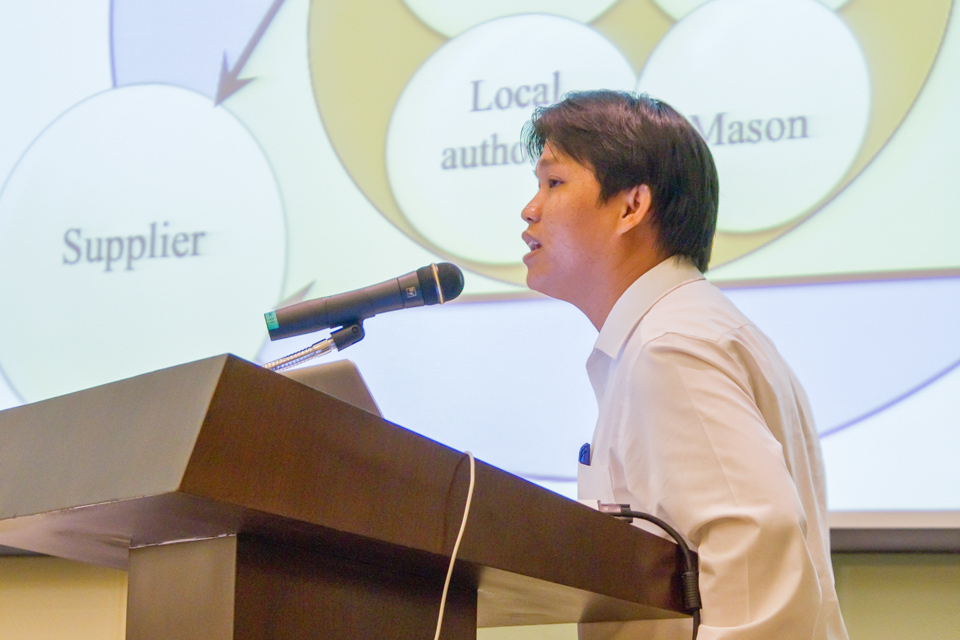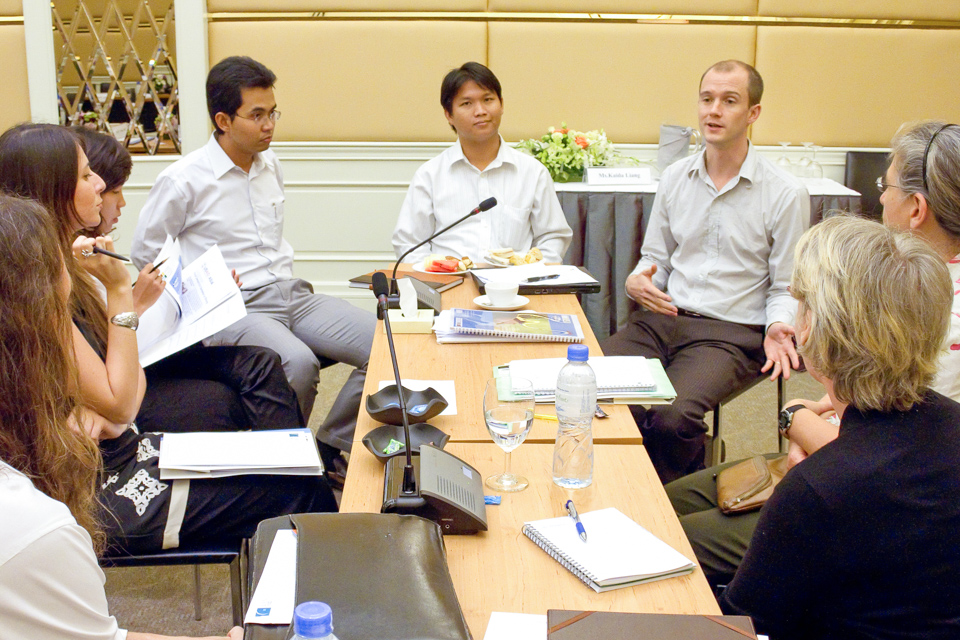WaterSHED Presents at “WASH Conference 2011″ in Brisbane, Australia
WaterSHED presented on a number of topics at “WASH Conference 2011” in Brisbane, Australia from May 16th-20th.
Selling Sanitation in Cambodia: How a ‘Hands-off’ Approach to Market Development is Increasing Rural Sanitation Access
Presenter:
Aun Hengly (WaterSHED WASH Marketing Manager)
Co-authors:
Danielle Pedi (Independent Consultant)
Lyn McLennan (Lien Aid)
Geoff Revell (WaterSHED)
Marion Jenkins (WaterSHED/UC Davis)

Aun Hengly (WaterSHED WASH Marketing Manager)
Abstract
Sanitation marketing is a relatively new approach for increasing access to sanitation at scale. Its consumer focus generates high adoption rates because suppliers offer sanitation products that households actually want and can afford. This presentation describes a further refinement of sanitation marketing: the “Hands-off” approach.
The “Hands-Off” model deployed in Cambodia used in-depth market research to develop targeted interventions for improving demand, supply and the enabling environment for local sanitation markets. Commission-based sales agents market low-cost latrines directly to consumers. Purchased units are delivered to homes and installed by local latrine manufacturers. Financing (consumer and working capital loans) is offered to buyers and sellers. Government officials at multiple levels play a strong enabling role, and social marketing campaigns- soon to be adopted nationally- appeal to emotion rather than reason to encourage latrine adoption. Early results indicate exponential growth in latrine sales. After an initial pilot sales period, project-supported enterprises are on track to achieve a collective sales target of 11,000 latrines in the first 12 months of marketing activities.
The “Hands-Off” model was pioneered by the WASH Marketing Project, a collaboration between Lien Aid and USAID’s Water, Sanitation and Hygiene Enterprise Development (WaterSHED) Program, with support from World Toilet Organization.
Sanitation Marketing Training Workshop
Presenters/Trainers:
Danielle Pedi (Independent Consultant)
Aun Hengly (WaterSHED Sanitation Marketing Manager)
Tamara Baker (Sanitation Program Manager, IDE-Cambodia)
This training aimed to equip practitioners and program managers with an understanding of the sanitation marketing approach, and an overview of the process (key phases, activities, methods, and resources) for designing and implementing a sanitation marketing program. The training provided an introduction to basic concepts, core strategies, and critical steps within a sanitation marketing program development cycle, drawing on the experience of Lien Aid, WaterSHED-Asia, and International Development Enterprises (IDE). The training shared tools and tips for strategic planning, product development, partnership building and field implementation. Participants were introduced to methodologies for collecting and analysing sanitation market data and worked in groups to practice training and interacting with sales agents, enterprises and government officials. While the training utilized data and examples primarily from experience in Sanitation Marketing in Cambodia, through Lien Aid/WaterSHED and IDE’s programs, it also drew on an example from Africa (Benin’s government-led approach) and elsewhere to illustrate the program development process from market research through to strategy development and design to implementation, monitoring, and scale up.
Partnerships to Facilitate Improved Financing for Water and Sanitation: Cambodian Case Study
Presenter:
Jeff Goldberg (WaterSHED-Cambodia, WASH Microfinance Research Intern)
This presentation introduced an innovative pilot project of the WaterSHED-Asia program in rural Cambodia, detailing specific contexts where microfinance may be used to improve the scalability of water and sanitation (WASH) products at the household level.
To improve access to WASH products (e.g., latrines, water filters), WaterSHED has established partnerships with three local microfinance institutions (MFIs), through which: (a) working capital loans are being offered to WASH product manufacturers, and (b) and ‘WASH Savings accounts’ and group loan schemes have been made available to rural households. This innovative pilot project provides key lessons for practitioners and the development community about new and effective financing approaches to secure pro-poor WASH solutions.
Based on the initial implementation of this program, the presentation examined the key criteria required to facilitate effective partnerships between MFIs, WASH service providers, and target communities. Likewise, the presentation evaluated the benefits and challenges (financial, operational and health-related, among others) associated with such partnerships, along with key recommendations and lessons-learned to promote their replication elsewhere.

